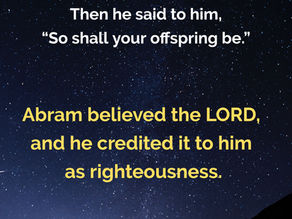Ecclesiastes 3:9-15 - Perpetual Monday
- Chad Werkhoven
- Jul 7, 2025
- 4 min read
It's Monday! Find out how you can find satisfaction in your toil this week.

Ecclesiastes 3:9-15
CONTEXT: The book of Ecclesiastes contain the writings of the Teacher, a character modeled after the life and wisdom of King Solomon, as he searches for meaning under the sun.
9 What do workers gain from their toil? 10 I have seen the burden God has laid on the sons of man (ʾā·ḏām). 11 He has made everything beautiful in its time. He has also set eternity in the human heart; yet no one can fathom what God has done from beginning to end. 12 I know that there is nothing better for people than to be happy and to do good while they live. 13 That each of them may eat and drink, and find satisfaction in all their toil—this is the gift of God. 14 I know that everything God does will endure forever; nothing can be added to it and nothing taken from it. God does it so that people will fear him.
15 Whatever is has already been,
and what will be has been before;
and God will call the past to account.
Canons of Dordt
Article 4: The Inadequacy of the Light of Nature
There is, to be sure, a certain light of nature remaining in all people after the fall,
by virtue of which they retain some notions about God, natural things, and the difference between what is moral and immoral,
and demonstrate a certain eagerness for virtue and for good outward behavior.
But this light of nature is far from enabling humans to come to a saving knowledge of God and conversion to him—
so far, in fact, that they do not use it rightly even in matters of nature and society.
Instead, in various ways
they completely distort this light, whatever its precise character,
and suppress it in unrighteousness.
In doing so all people render themselves without excuse before God.
Summary
Most people will read this on a Monday, that most dreaded day of the week in which the grind of work edges out the fun and rest of the weekend (although for too many, the 'fun' far surpasses the rest). Today millions of people - perhaps even yourself - will wonder along with the Teacher what do workers gain from their toil? as they drag themselves back to work.
But the fact that Mondays are so universally loathed is actually one of the greatest testimonies to the truth of scripture! The Teacher here writes of the burden that God has laid upon the hearts of the sons of ʾA·ḏām. On one hand, as image bearers of God we have an ability to see, appreciate and long for the beauty of God's creation in a way no other creature can. But on the other hand, it quickly and painfully becomes evident that our work in this beautiful world is cursed. Mondays painfully remind us that things are not the way they're supposed to be.
Our problem, writes the Teacher, stems from the same root so many other Biblical writers identify and which we've noticed so often as we've read the Bible together these last few months: the noetic effect of sin - the fact that apart from God's grace, people can no longer think properly. No one can fathom what God has done from beginning to end. Or as the NET Bible translates it, people cannot discover what God has ordained.
In other words, sin has blocked people's ability to understand who God made them to be and what He's designed them to do. As a result life for them has become a perpetual Monday: purposeless, hopeless, corrupted, and anything but the beautiful thing God created it to be.
Dig Deeper
The Teacher's prescription for this broken world seems trite, especially if it's read apart from his overall message. Just be happy and do good while you live. Believe it or not, all people, regardless of whether they've experienced God's grace or not, have the ability to follow this seemingly simplistic advice. As the Canons put it, people in general demonstrate a certain eagerness for virtue and for good outward behavior.
But despite the inability to think clearly that came as the result of Adam's sin, people still instinctively know that things are not the way they're supposed to be, and this fuzzy knowledge continually sabotages people's ability to be happy. We know this, writes the Teacher, because God has set eternity in the human heart.
All people know in their heart of hearts that there's something more, and this insatiable longing makes those who live apart from God's grace miserable. They know this world is broken, and that there has to be something more, but they can't ever figure it out. The flickering light of nature that they still retain is far from enabling them to come to a saving knowledge of God and conversion to him.
So be thankful that God's grace is stronger than you are - that it's restored your ability to fathom what God has done from beginning to end and to satisfy your natural longing for peace with your eternal Creator. Mondays will still have their problems and challenges, but as one who is saved by grace, you can joyfully fulfill the purpose God created you for: to eat and drink and find satisfaction in all of your toil - this is the gift of God.
ACKNOWLEDGE WHO GOD IS: Our Father, who has made everything beautiful in its time;
ALIGN YOUR LIFE WITH GOD'S WILL: Thank God for His grace which has restored your ability to fathom Him, and pray that your work will glorify the one who freed you from meaninglessness;
ASK GOD FOR WHAT YOU NEED:
Read the New Testament in a year! Today: Luke 7



















Comments